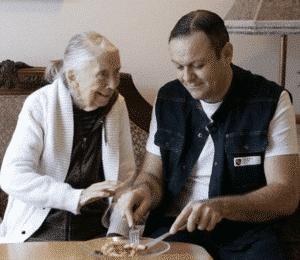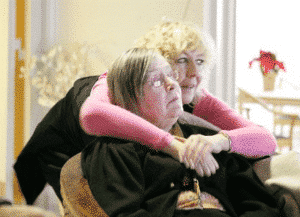Good practice in implementing person-centered care of people with dementia in nursing home.
In order to implement the person-centered care in an organization, it is necessary to have a clear vision and an instruction on how to reach the vision. The vision must create a common direction for the work and be a collaboration between management and employees. In the daily work, the leader must go ahead and show that she/ he respect the goals and vision. Tom Kitwood believes that treating your own staff “person-centered” is a prerequisite for developing the desired care culture. There is a need for the staff of an organization to feel recognized by the leader being included and respected in the community.
Management must give the staff individual freedom and responsibility always to act in the interests of the person with dementia within the current framework of care. A person-centered care culture implies that the organization is open to and provides room for learning and development.

The person – centered approach implies that the staff work with the person’s personal goal care plans based on the person’s own preferences and goals. The goals are revised on a continuous basis. The person must be considered a member of the team and he/she must have a contact person.
Work in multidisciplinary teams is the preferable, teams that are flexible and that can adapt to changes in the person’s health status, circumstances, need for care and life goals.
There must be an active coordination of all actions. Coordination is especially at the center when the person with dementia moves from one place to another. It is the task of the contact person to put it into practice. The team must communicate and share information continuously to all care teams. It is especially when a person crosses different administrative sectors that there are challenges in creating a well-coordinated process.
Education and training is necessary for the staff and it may be necessary to train the relatives as well.
In the work with the person-centered approach, it is also necessary to measure whether the efforts work and contribute to improve the quality. This can be done using feedback from the residents, relatives, and staff.
The individual employee will need to have a number of skills to work with person with dementia in a person-centered approach.
The employee must:
• Appreciate the person with dementia, as a unique and equal person despite the mental deficiency.
• Organize an individual care and treatment based on the specialness of each individual.
Try to understand what is best for the person with dementia from the perspective of the person concerned.
• Protect the person’s self-determination, rights and opportunity for co-determination.
• See the person with dementia as an active partner.
• Seek to involve the person’s social network in care.
• Try to establish a personal relationship with the person with dementia.
 |
 |
• Create a supportive environment around the person.
In addition to basic physical needs, it is therefore essential that the staff generally focus on the fact that every person need:
• Support in maintaining his/her identity.
• Help to make the most of their resources.
• Help to remain an independent social person.
• Help to maintain his identity as far as possible.
In particular, there is a need for specific professional skills in dementia, such as knowledge of social education impact. Focus on the whole human being and the important life story and that the person’s day has 24 hours. It is necessary with speciffic relationship skills if:
• Person’s lack insight in their own disease.
• The out reacting person.
• The unhappy person.
• Younger person’s with dementia.
• Collaboration with relatives.
• Person’s with non-western background.
In addition, skills are needed to deal with dilemmas, reflection and reasoning.
